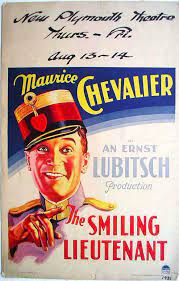
THE SMILING LIEUTENANT
US, 1931, 88 minutes, Black and white.
Maurice Chevalier, Claudette Colbert, Miriam Hopkins, Charlie Ruggles, Elizabeth Patterson.
Directed by Ernst Lubitsch.
This is an English-language version of an operetta, 1931, and a French version made at the same time with the same cast.
This is classic filmmaking of the early 1930s, directed by the master-director of this kind of entertainment, Ernst Lubitsch. And, it was a star vehicle form Maurice Chevalier, so popular in France, but appearing in a number of American films of the period – and his later making an American comeback in the 1950s, with Gigi, followed by a number of American films.
The female stars were at the beginning of their careers, Claudette Colbert, soon to win an Oscar for It Happened One Night, 1934, and a very strong career in Hollywood to the 1950s. She plays the new girlfriend of the smiling guard and is a talented violin player. Miriam Hopkins plays the awkward princess from a neighbouring kingdom who misinterprets a smile from the Lieutenant, marries him, and eventually receives instruction on how to be an attractive wife from the violin player.
Brief running time, considered a classic of its time – but would not have been so forthright in its depiction of relationships and sexuality after the introduction of the Motion Picture Code in 1934.
- An entertaining romantic comedy of the early 1930s? Pre-code and presentation of moral issues? The Ernst Lubitsch touch?
- The Austro- Hungarian Empire and the pre-World War I behaviour and protocols? Yet the modern setting, costumes and decor, vehicles…, The 1920s? Small kingdoms like Lichtenstein?
- Lubitsch and his directorial style, camera style, editing? The Lubitsch touch, wit, sophistication, perspectives on behaviour? Innuendo?
- The title, Maurice Chevalier, his French reputation, American films, performance, singing, screen presence, rakish attitudes? Nick, Vienna, military status, his friends, seeing Frantzi and her violin, pursuit, repartee with her, the relationship? Smiling at her, on guard for the king and Princess, the Princess and her interpretation? The media against him? The authorities, summoned by the King, his smooth talking his way out of the situation? The set up of the marriage situation, his being trapped? The relationship with Frantzi, the break, her message and garter? Trapped into the marriage, the relationship with Anna? The marriage night, his reluctance, meeting again with Franctzi?
- Frantzi, the orchestra, violin, attracting Nick’s married colleague? The meetings with Nick, her repartee, warning him off, succumbing, breakfast? The relationship? The crisis with his smile, the media? Breaking off the relationship? Summoned by the police, the encounter with Anna, talk, slap, mutual regard, her advice about the piano, clothes, underwear… The lingerie song? Her regrets?
- Anna, Princess, narrow life, relationship with her father, the visit to Vienna, the reaction to the smile, upset? Nick summoned, her talking with him, his calling her beautiful, her relenting, falling in love? The forced marriage? The ceremony, the wedding night, the preparation of the bed and pillows, the formalities of the court declaring the marriage room…? Nick walking out, her reaction? Her attempts to cajole Nick? The encounter with Frantzi, upset, talk, the change, her playing the piano? The change of clothes – and Nick succumbing?
- The background of the Austro- Hungarian Empire, the role of the Opera? The small countries and the small monarchies? Pomp and circumstance?
- The background characters, Nick and his faithful assistant? The police and the military? The members of the court, the ladies in attendance?
- 21st-century perspectives on relationships between men and women, men and their superiority and sexism? Nick as rakish but also callow and shallow?
- The music, the operator background, the songs, familiar from this kind of film? Yet the lyrics, the details of the breakfast song, the injuries song, finding love in the Army…?